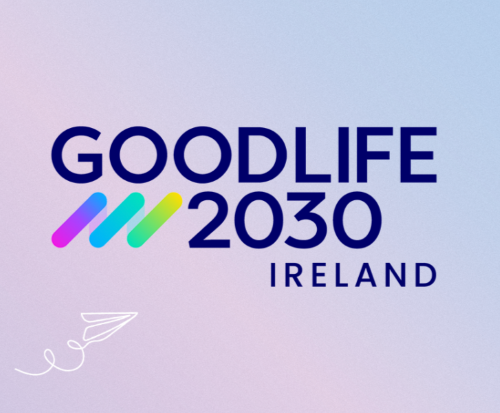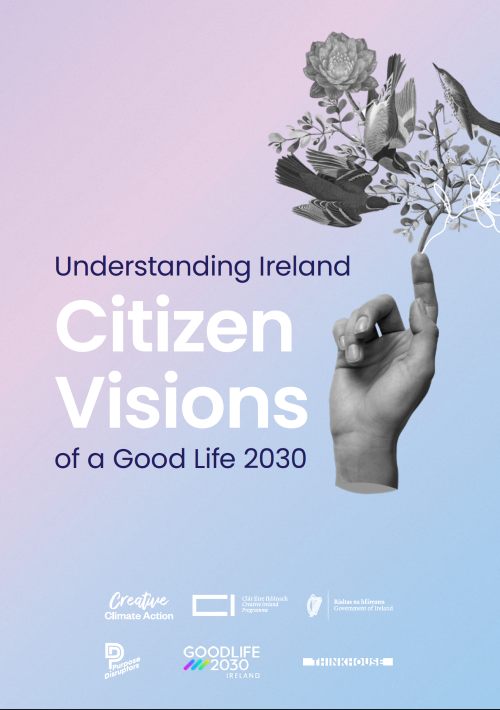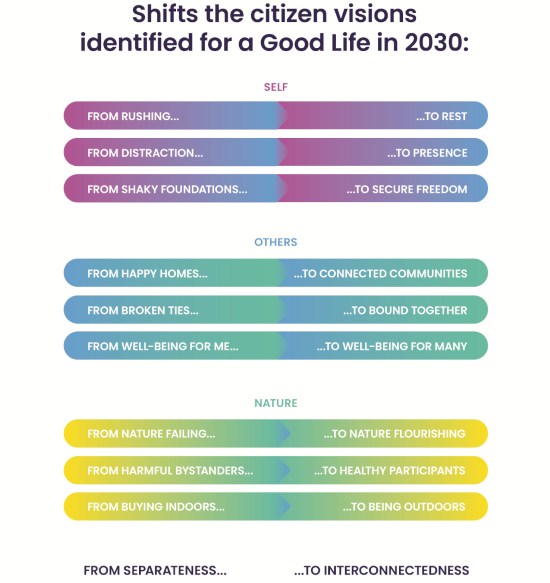
New Good Life 2023 shows Irish reappraising what the ‘good life’ means
Today Good Life 2030 Ireland launches its first citizen vision report. The report uncovers insights into what Irish people believe a ‘good life’ looks like for them in the year 2030.
“A move from hustle-culture and precarious living to a slower, more self-sufficient lifestyle; more time in nature and with those we care about – Ireland’s citizen’s appraisal of what a good life looks like is shifting away from the consumerist ‘more more more,’ materialist, emissions-heavy culture to a more attainable, connected future.” said Laura Costello, the Good Life 2030 Ireland Project lead.
This in-depth, nationally representative piece of qualitative and quantitative research invited citizens of Ireland to describe their values and articulate their vision for a ‘good life.’
The project looks to 2030, a critical milestone for halving carbon emissions that Ireland is currently not on track to meet*. Whilst there is widespread awareness and concern about climate change, to many people, the changes required seem like compromises that could negatively impact people’s lifestyles.
This project sets out to explore what citizens really want from their lives, and uncovers how these visions can support Ireland’s 2030 objectives.

Research Findings
The research demonstrates that, when articulating their vision for the future, nothing matters more to the people of Ireland than ‘feeling connected.’
Within this overarching theme, there are three consistent and distinct threads: a desire for more connection to others, nature and themselves.
OTHERS: 55% percent of adults feel the greatest sense of well-being and contentment when spending quality time with ‘people I care about’.
The qualitative interviews supported this, showing that in 2030 citizens dream of being more connected to others: to build more connected communities, strengthen cultural cohesion and enhance the well-being of those around them.
NATURE: Two in 5 adults (37%) feel the greatest sense of well-being and contentment when they are being ‘active, fit and healthy.’ Citizens see a direct relationship between their own health and the health of the natural environment. While a further one in four (26%) feel best when ‘I am outdoors enjoying nature’.
The qualitative interviews further explored citizen’s visions for 2030 in this area. Respondents want to be more deeply connected to nature; to see nature flourish; to help protect and conserve the natural world and to be more embedded in the outdoors.
SELF: One in three Irish citizens (29%) report feeling the greatest sense of well-being and contentment when they’re ‘taking time for myself.’
The qualitative interviews supported this with citizens articulating how, by 2030, they would like to be more connected to themselves; to move away from hustle culture and embrace a slower pace of life, with less precarity and greater opportunities for self-sufficiency.

Barriers: Time and Energy
The biggest barrier for citizens in consistently living their idea of a ‘good life’ today is not having enough time or energy. Nearly half, 42%, of adults claim that they ‘don’t have the time or motivation to think beyond today or redirect my life.’ The second-biggest challenge is opportunity and external influences -with 24% of respondents feeling like they don't have the ‘opportunity to create change.’
Low Carbon Lifestyles
Notably, the visions shared reflect low-carbon lifestyles that are not reliant on more material possessions or expensive trips. Citizens were least likely to say that their greatest sense of wellbeing or contentment came from ‘being spontaneous’ (5%), ‘busy all the time’ (5%) and ‘working and developing my career’ (6%).
The Time to Reflect is Transformational
The process of reflection itself was transformational for citizens who took part in the interview process which was carried out by engaging people over 3 days using multiple ways to reflect and unlock their visions for 2030. Almost half of participants (43%), since becoming part of the project, are making changes or intend to make changes in their life, reflecting the mindset shift that the process inspired. Actual behavioural changes ranged from being more aware of the attention they were giving to their devices to putting their house up for sale. The process itself demonstrates how today’s world allows little time for valuable reflection on what a good life actually means.
This research builds upon a growing body of citizen reports produced by Purpose Disruptors, which demonstrate what UK Citizens dream of in the future. The nuances between the two countries are highlighted in the full report.
The role of the Advertising Industry in creating the image of ‘a good life’
Purpose Disruptors (an organisation founded by ex marketing, media and advertising industry leaders, on a mission to catalyse the advertising industry's climate transition) and THINKHOUSE (a B Corp certified, full-service, digital-first marketing company for progressive brands that care about people and the planet) are behind the Good Life 2030 Ireland project, funded by Creative Ireland as part of the Creative Climate Action Fund.
The modern advertising industry has played a key role in driving an emphasis on a “good life” of more – stuff, status and wealth. Through Advertised Emissions**, Purpose Disruptors has demonstrated that the industry has, so far, ‘taken the world in the opposite direction of where it needs to go.’ It is actively encouraging the industry to transform in service of a thriving future and this project is part of this work.
The research showed that citizens are divided on their view of advertising and its influence. Forty-five percent of Irish people agree that ‘the world would be better off without advertising in its current form’. However, 77% of citizens agree that ‘the advertising industry should help people lead healthy, sustainable lives’. To facilitate the necessary culture, behaviour and system change needed to halve carbon emissions by 2030, this project aims to work with citizens and the advertising industry, to create a new narrative, informed by real everyday people, that improves human and planetary wellbeing for all.
Laura Costello, Head of Sustainability & Planet Services at THINKHOUSE and Ireland Lead for Purpose Disruptors, said: “The question ‘what is a good life?’ has preoccupied humans across time. As an industry our collective answer to this question has leaned in one direction for long enough. It’s time for our industry to realise its true potential – to shift our focus in service of a thriving future. As architects of desire, the advertising industry shapes our cultural understanding of a life worth wanting. Science states we need to halve emissions by 2030. But 2030 has an image problem. People aren’t emotionally connecting to the future we need to create. The invitation now is for those in the marketing, advertising and media industry to embrace our unique expertise and our responsibility to rethink what’s being sold and imagine a new ‘good life’ story that serves all living systems. A 2030 Good Life is ours to create.”
The Good Life 2030 Ireland citizen vision report is just the beginning of the project. The next phase of the campaign will see people working across the marketing, advertising and media industry in Ireland create a nationwide campaign in response to the citizens' visions.
Anyone working in the marketing, advertising and media industry in Ireland is invited to be involved, email: planet@thinkhousehq.com with the subject line ‘Good Life 2030 Ireland.’
Follow the Good Life 2030 Ireland project @goodlife2030ireland on Instagram where you can listen to audio clips of citizen visions.
Download the full report here: https://www.goodlife2030.earth/tools-resource.
*Ireland's GHG emissions have increased by 9.2% from 1990-2022 – EPA.
Global energy-related CO2 emissions grew by 1.1% in 2023, increasing 410 million tonnes (Mt) to reach a new record high of 37.4 billion tonnes (Gt) – IEA.
**The more adverts we see, the more stuff we buy: Advertised Emission.





